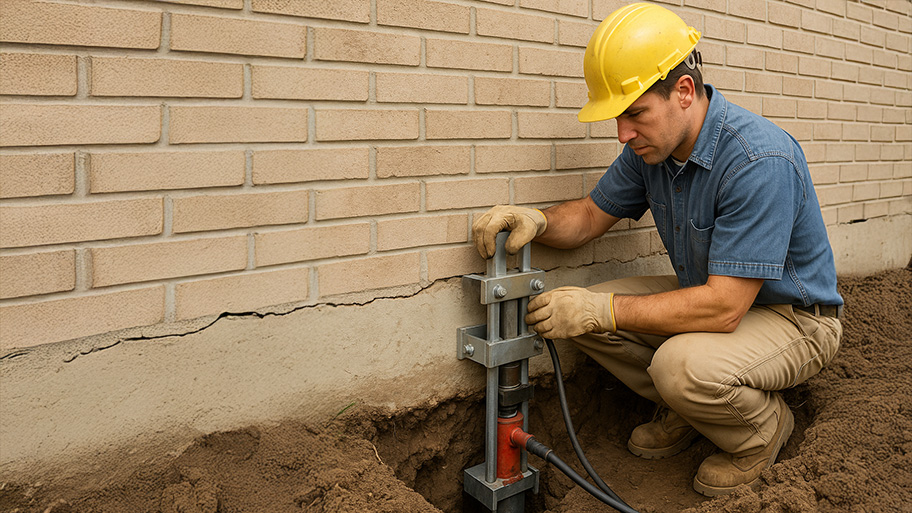
Staying ahead of foundation problems can save you time and effort. Learn how much foundation inspections cost and what affects how much you’ll pay.
Foundation repairs can be stressful, but having the right inspector can put you at ease


Even if you try to do everything right and take actionable steps to prevent foundation damage, it can still occur. Signs of foundation damage include cracks in your floors, basement walls, along your windows and doors, and more. When you notice these, you’ll want to call a pro right away to make sure your foundation performance doesn’t suffer and the problem doesn’t get worse.
Hiring the right local home foundation repair inspector can give you the peace of mind that your home base will be taken care of and make the entire foundation repair process run more smoothly.
The best way to determine who inspects foundations in your area is to speak with your neighbors and search within your zip code for experienced professionals. Local foundation inspectors will have an in-depth knowledge of how your local climate affects the health of your home as well as common problems to your foundation design. We always recommend choosing at least three prospective inspectors and walking through the process below before making a final decision.
Even if someone claims that they are familiar with foundations, always walk through the steps below. Inspectors should hold certification in the field and be able to demonstrate past experience. Keep in mind that you may need specialized contractors for some types of foundations, such as when choosing someone to inspect your crawl space.
Many home foundation inspections are done by a home inspector (especially if you are buying a house) or a foundation company’s estimator. It is wise to hire a company that at least has a licensed, unbiased foundation engineer on staff who oversees the inspection, the analysis, and the recommendations before you receive them. Be sure to ask about this before you hire the company.
The individuals performing your home’s foundation inspection and analysis should hold training certifications from credible organizations in the industry, such as independent foundation associations. Do your homework and conduct a diligent search of the business you are hiring.
Make sure to get quotes and estimates from at least three companies, ask for samples of work they have done, and inquire about their certification credentials. You can even ask for references from other customers to really get a sense of their past work.

Setting up an onsite inspection will help the inspector assess the situation and determine if there’s any damage to the foundation. Although inspectors can get a sense of the state of the foundation during the check, they will also analyze the data collected offsite and deliver a complete report with findings and an action plan later.
Most structural engineers won’t give you a complete repair plan on the spot without analyzing the findings first. Ask to see a sample report before hiring to see how detailed the report is and if it meets your expectations.
This aspect is more important than you might think. Soils and building practices vary greatly across the U.S. That's why it's a good idea to consider hiring a company that has previous work experience in your town or city. A service provider that is based outside of your area may not be as familiar with the soil conditions as companies based locally.
Communication is key. Even if you have the best inspector in the world, it will be frustrating and unhelpful if they don’t communicate well. Make sure they take the time to help you understand the process and any critical issues beforehand, and communicate those using visual aids.
Before you hire a company, make sure they can explain foundation problems in layperson’s terms. Ask how they will contact you with further details, whether that is via email, text, or phone call, and make sure that aligns with your communication expectations.

Following the inspection, companies will often give you a specific solution to your foundation problem. However, a good foundation repair company will also mention a wider range of solutions you can try, including ones that involve technologies they do not have.
While this can be tough to know before you hire them, be sure to familiarize yourself in advance with the company's foundation repair solutions. A repair company should be frank and honest if the repair is outside their scope of service and not try to offer a service they can’t guarantee. If they recommend something they haven't discussed with you before, get a second opinion from a different company.
Both before you hire a foundation inspector and during the inspection itself, keep these questions on hand. Your inspector should also be able to recommend the next steps after the inspection to clarify who to hire for potential repairs. Here are some questions to consider for your notes.
What is your experience inspecting homes in the area?
Do you adhere to the industry standard for a thorough inspection?
Are you experienced in inspecting my type of foundation?
What types of issues do you typically look for in foundations in the area?
How long have you been in business?
Do you have local testimonials or referrals from past clients?
Do you have a license and insurance to practice?
If you have been experiencing foundation issues, write up specific questions related to what you've noticed. Prepare to be present for the visual inspection to answer questions about past repairs or problems.
Foundation inspectors will offer an official report after their visit. The report is necessary when buying or selling a house or when proving that your home meets the local building codes. It is also very helpful when you own your home but need to find a foundation repair company to start the project. The report should help the next contractor write up an estimate and suggest repairs for issues such as cracks, leaks, pest problems, bulging walls, or structural concerns.
From average costs to expert advice, get all the answers you need to get your job done.

Staying ahead of foundation problems can save you time and effort. Learn how much foundation inspections cost and what affects how much you’ll pay.

Unstable or sinking foundations require comprehensive and expensive solutions. Learn about foundation underpinning costs in this guide to set your budget.

Whether trying to protect it or transport it, raising a house is no small feat. Read on to find out everything you need to know about the cost to raise a house.

Which pole barn foundation option is best for your area and the size of the pole barn you’re building? Check out five of the most commonly used options.

Unsure if a crawl space or a basement foundation is better? Learn about the pros and cons of each, how they compare, and which is better for your home.

A house’s history of foundation repairs doesn’t always mean you shouldn’t buy it. Learn what to consider when purchasing a house with an unstable past.